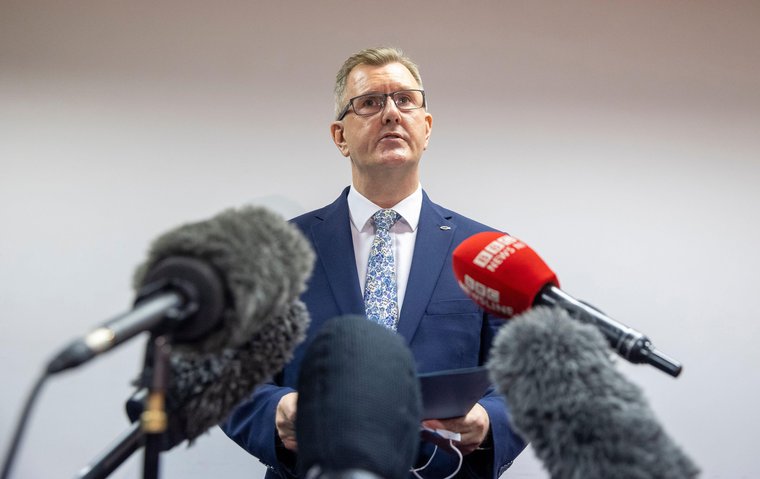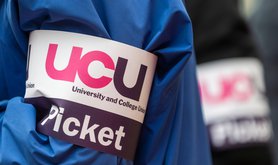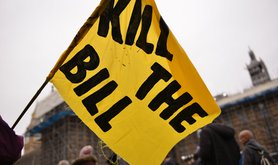
Jeffrey Donaldson sued us. Here’s why we’re going public
The prospective DUP leader tried to silence our journalism. We need politicians who will stand up for press freedom

Journalists rarely like to talk publicly about the times they’ve been sued. Even uttering the word ‘defamation’ can bring back stress-filled memories of expensive lawyers’ letters, threatening to take you to court unless you pay untold sums in damages.
For small, non-profit media outlets like openDemocracy, the risks are even higher. Losing one court case could literally put us out of business.
But there comes a time when journalists need to speak up about specific legal threats they’ve faced. And we believe that, for us, the time is now.
This week Northern Ireland’s Democratic Unionist Party chooses a new leader. (Well, a small circle of the party’s 36 MPs and Northern Ireland Assembly members will choose one.) For many, the frontrunner is the party’s Westminster leader: Jeffrey Donaldson.
Donaldson, a former aide to Enoch Powell, is probably not a household name in British politics. But he is very well known in openDemocracy’s small office – because he sued us, and one of our journalists personally.
It all began back in 2017, when we first broke the story of a record-breaking, controversial donation to the DUP’s Brexit campaign. Throughout the year the DUP came under intense pressure from our reporting.
Donaldson, who’d managed the party’s Brexit campaign, repeatedly dodged our questions and insisted that he and his party had broken no rules. The UK government would eventually be forced to change the law in the wake of the scandal, ending the secrecy of political donations in Northern Ireland.
If we went to court to defend our reporting, we risked bankrupting openDemocracy
The following May, we published a story about an organisation called the Causeway Institute for Peace-building and Conflict Resolution: a company run by Jeffrey Donaldson and his brother, Kingsley.
Shortly afterwards we received a letter from an expensive law firm, acting on the Donaldsons’ behalf, threatening to sue us.
We were advised that if we went to court to defend our reporting, we risked bankrupting openDemocracy. We had staff worrying they would lose their homes. Reluctantly, we took the story off our website.
But the legal threats did not stop there. Donaldson issued proceedings in Northern Ireland, where he stood a much higher chance of winning.
We never ended up in a courtroom: instead, the Donaldsons dragged the ordeal out over two years, right up until May 2020 when their legal time limit to actually proceed the case finally ran out.
Those two years cost us a lot. We spent months dealing with legal letters, burning through thousands of pounds and precious time that would otherwise have been spent on our journalism.
The psychological toll was even higher. We wanted to defend our story, but how would it play out in a Belfast court, under laws that have been said to “invite libel tourism”?
On press freedom, Northern Ireland is still a place apart... it's much easier to sue journalists there
The tactic of issuing time-consuming legal proceedings but not serving them on the defendant is a familiar one for many journalists. Experts speak of the ‘chilling effect’. These are the stories that go unwritten, the leads left unpursued, while the fear of being put out of business hangs over you.
To Jeffrey Donaldson, it may well have been worth the time and money to threaten us with court action for so long. He was, after all, occupying centre stage in our long-running investigation into the DUP’s controversial £435,000 Brexit donation. The money had been funnelled through an obscure shell entity in Glasgow, chaired by a former Scottish Conservative parliamentary candidate with links to gun-runners and Saudi secret services.
Thanks to our journalism, voters in Northern Ireland now have a right to know who bankrolls their political candidates, just as voters in the rest of the UK do.
But when it comes to press freedom, Northern Ireland is still a place apart. Why? Because the DUP made it so. In 2012, then DUP Stormont minister Sammy Wilson – apparently with support from Northern Irish first minister Peter Robinson – took the single and unchecked decision to halt the extension of the reforms of English and Welsh defamation law to Northern Ireland.
As a result, it’s much easier to sue journalists in Northern Ireland than anywhere else in the UK – although reporters still face legal threats across Britain. The acclaimed journalist Catherine Belton is currently facing a slew of lawsuits in English courts from Russian billionaires over her book on Vladimir Putin’s rise. At openDemocracy, we’ve received countless legal threats over the years.
And that’s why Jeffrey Donaldson matters. Real leaders speak up for press freedom, they don’t target small media organisations whose reporting they don’t like.
It’s easy to dismiss the DUP leadership contest as a sideshow. The party is far from the mainstream of British political opinion. The former leader Arlene Foster’s disastrous tenure ended after she refused to vote against a proposal to ban gay conversion therapy in Northern Ireland.
But the DUP has been a powerful force in British politics – as we saw after the 2017 election when the Democratic Unionists had the whip hand over Theresa May’s government. The party is still the biggest in Stormont.
Jeffrey Donaldson is pitching himself as the ‘moderate’ candidate in a race that will have a major bearing on politics in Northern Ireland, and beyond. So today, we are doing something that doesn’t always come naturally to journalists. We’re speaking up about how he tried to silence us.
Read more
Get our weekly email




Comments
We encourage anyone to comment, please consult the oD commenting guidelines if you have any questions.